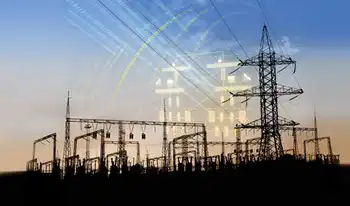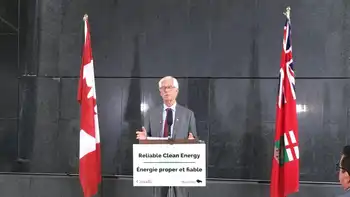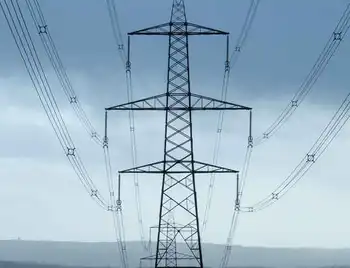Residents get to sound off on NY power line plan
By Associated Press
Arc Flash Training CSA Z462 - Electrical Safety Essentials
Our customized live online or in‑person group training can be delivered to your staff at your location.

- Live Online
- 6 hours Instructor-led
- Group Training Available
"Ultimately, it's nothing more than an extension cord running through someone else's bedroom," said Steve Skollar of Hamilton, one of nearly three dozen people who spoke against the New York Regional Interconnect plan at the first of 13 public hearings being held on the project by the state Public Service Commission.
"This is a bad idea for New York and would be a tragedy for the area," said Skollar, whose house would sit within a quarter-mile of the proposed line.
NYRI wants to build a $2.1 billion transmission line running from the Utica area through seven upstate New York counties to Orange County to bring power to the New York City area. NYRI says the 1,200-megawatt line is needed to improve the state's aging power grid and reduce the threat of blackouts like the one that struck the state in 2003.
But the project has generated intense opposition from residents and local governments along the proposed path who say it will harm their communities and lead to higher costs for power. The hearing was the first chance for residents to express their opposition. About 75 people attended the hearing, the first of two scheduled at Colgate University. That session was expected to be more heavily attended, opponents said.
Chris Rossi, a co-chair of the citizens' group STOP NYRI, said the project would threaten the region's future as a tourist destination because the towers would be an eyesore. Rossi said the area is a "living museum of 19th century land use and transportation," noting it is the home of the Erie Canal and underground railroad.
"The massive towers... would dominate the landscape and completely devastate the historical integrity of the route," said Rossi, of Hubbardsville.
Eve Ann Shwartz, co-chair of STOP NYRI and a vice chairman of the municipal coalition against the line, Communities Against Regional Interconnect, criticized NYRI because it has asked the federal government to guarantee profits of between 11 and 13 1/2 percent.
"My father built a thriving dairy and beef farm... without the help of the federal or state government subsidizing his business or guaranteeing him a profit," Shwartz said.
Shwartz said the proposed line would cut across her family's 1,200 acre farm for 1.8 miles and require her family to yield "clearing rights" on 16 acres, which includes its most productive corn and alfalfa fields. Increased power costs would be a hardship for farmers, as well as those in the food processing and light manufacturing industries.
Instead of a power line, Shwartz said the state would be better served by improved conservation and building electricity generating plants closer to where the power is needed.
In a recent review, New York's Independent System Operator said the state's existing transmission lines can provide sufficient and reliable electricity for the next 10 years without NYRI, said Owen Tallman, of Hamilton, who called the project a "white elephant."
Other speakers said the power line would reduce real estate values by between 10 percent and 40 percent and create a health hazard for local residents.
NYRI wants to build the line mostly along old railroad beds in one of two areas identified by the federal government as "national interest energy transmission corridors."
The company has said the line would run largely along the old railroad rights of way, but the PSC has asked NYRI to consider alternate routes. NYRI has said it would bury part of the line underground in the most densely populated section near Utica, but that doing so for the entire length of the project would be too expensive to build and maintain.
Jane Welsh of Madison said she is worried Washington officials would step in and approve the power line project even if the PSC rejects the project — a power it can evoke inside the special transmission corridors.
"The NYRI project is nothing short of a rape perpetrated upon our local communities by a wealthy and politically connected group of outsiders," Welsh said.
Welsh also objected to NYRI being able to exercise eminent domain to acquire private property.
Outside the hearing, opponents constructed a mock cemetery with cardboard tombstones. Each bore an RIP for something opponents say they will lose if the project proceeds — tourism, landscape, health, jobs, and real estate values, among them.
The public hearings continue for the next three weeks. The final hearing is Nov. 6 in Norwich.











